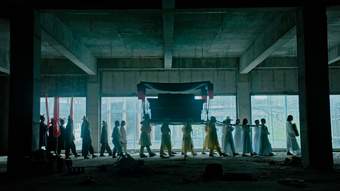A metaphorical opening to the series, The Haunted renders histories of subjugation through an open letter to the Turan tiger. The animal’s population was assessed as extinct in 2003. Still present in the memories of Uzbeks and Kazakhs, it leads the artist to discuss complex issues of spiritual longing and lost connections with the land. Ismailova’s attention to the layered culture of her motherland translates into her blending of archives. In the film, she edits scenes from her native Uzbekistan, where the tiger was last seen, together with ‘ghost archives’; recollections gathered in interviews and dreams. The score, by Oslo-based composer Camille Norment, welds recordings from a glass harmonica and Ismailova’s own voice, echoing the tiger, a discreet feline whose low frequencies were said to hypnotise its victims.
This tension between the personal and the collective recurs in Ismailova’s work, which investigates the difficult transitions that affected her country, before and after the Soviet regime. Chillpiq, the second film in the programme, keys the artist and members of her community spontaneously performing a fertility ritual. It depicts a group of women walking around a dahna, or cemetery, in Karakalpakstan, an autonomous republic in northeast Uzbekistan. Together, they recall the characters of a widely spread myth, QYRQ QYZ, which traces the construction of the site back to the final battle of forty amazons against the Persians. In the film, though, an abandoned metal flagpole, leftover from the Soviet period, becomes a site for remembrance. Through citation, Chillpiq dissolves boundaries between mythology and the present, picking up where The Haunted left off, near the Amu Darya River basin.
Mythical women feature prominently in Her Right. In this short work, Ismailova repurposes footage from Uzbek cinema to extrapolate on their role in the country’s history. The film directly evokes hujum, a political movement of emancipation led by Muslim women under the Communist regime for the right to remove their burqas. Through the amalgamation of excerpts from rare films by Latif Fayziyev, Ali Khamrayev, Shukhrat Abbasov, and others, and an inventive score by London born musician Seaming To, the work also comments on the role played by cinema in women’s ongoing battle for self-determination.
This screening is part of a three-day programme devoted to artists engaging with a transnational movement of resistance. Further information is available on our Tate Film page.
The programme will also include readings of Ismailova’s poetry by fellow artists and members of the DAVRA collective Nazira Karimi, Dilda Ramazan, Jazgul Madazimova and Munis Kholkhujaeva, in different native languages from Central Asia.




